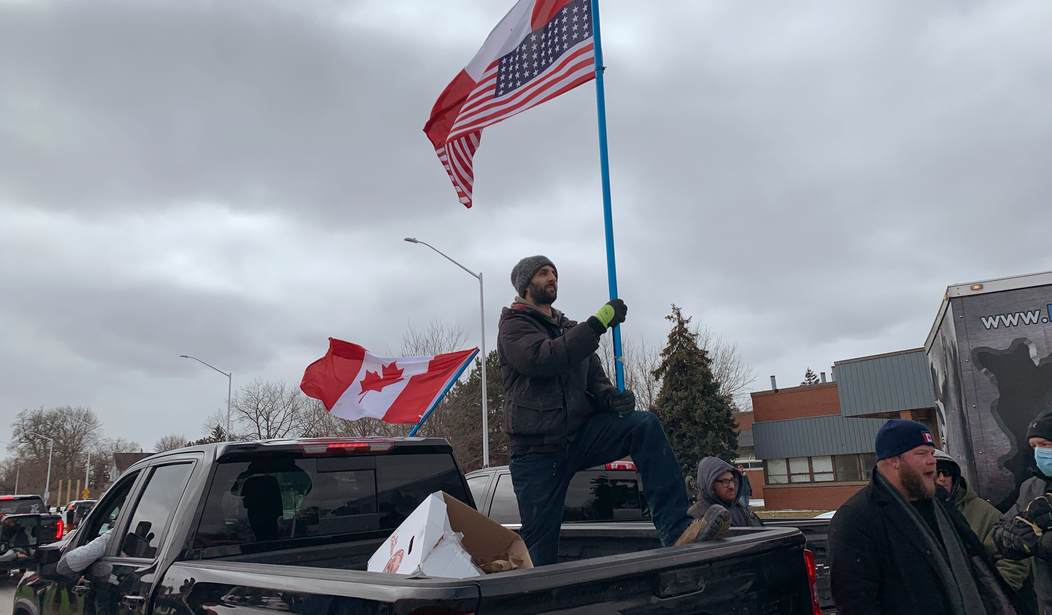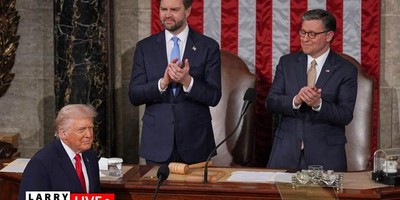In the popular dystopian novel The Handmaid's Tale, by Canadian author Margaret Atwood, the fictional authoritarian government begins its reign of terror by cutting off women's access to money and to the financial system generally.
Monday night, Canada’s House of Commons voted to extend Prime Minister Justin Trudeau’s self-declared emergency powers and endorsed the use of such power in real life. The entirety of its government is now complicit in the demise of Canadian freedom.
Beginning February 14, Trudeau invoked the Emergencies Act and the Proceeds of Crime (Money Laundering) and Terrorist Financing Act (PCMLTFA) to suppress protests by Canadian truckers who objected to government Covid-19 mandates. Referring to the truckers as a “fringe minority” with “unacceptable views,” Trudeau invoked war powers against his own populace. These powers allow Trudeau almost full control over Canadian persons and property, forcing the movement and labor of individuals (such as tow truck drivers to remove the convoy) and the freezing and seizing of personal assets. And not just against the protestors but anyone associated with the protests.
Trudeau’s sweeping powers put patriotic Canadians who supported the truckers’ protest, whether by donation to GiveSendGo or by serving food to truckers, at risk of doxxing and financial recrimination. The chilling effect cascades to innumerable others with “unacceptable” anti-government views.
Observing these totalitarian actions by the Canadian government and its banks - acting as corporate arms of governmental bureaucracy - I can’t help but wonder if such lawless economic punishment of political speech will happen here. An internal battle wages as I write: what if they empty my bank accounts for wrongthink? No, this is America; and our government cannot seize our private property. Or can it? Will it?
Recommended
In July 2021, entrepreneur, venture capitalist, and PayPal co-creator David Sacks wrote Get Ready for the “No-Buy” List, where he condemned PayPal’s decision to block a Christian crowdfunding site that raised money to bring citizens to Washington to protest Congress's January 6 Electoral College certification vote. PayPal later partnered with both the Southern Poverty Law Center and the Anti-Defamation League to shut down accounts considered “too extreme.”
Sacks said he helped create PayPal in 1999 so that “ordinary people” wouldn’t be “dependent on large financial institutions to start a business.” By 2021, Sacks observed PayPal was “turning its back on its original mission” and “leading the charge to restrict participation by those it deems unworthy.” His prediction: FinTech would act in bloc to cancel financially and economically those with the wrong opinions, similar to BigTech shutting down politically incorrect speech, at government’s subtle behest.
Today in Canada, Sacks’ warning has come to pass. Can we prevent a similar fate in America?
In “A Social Credit System Arrives in Canada,” Sacks suggests the answer lies in “politics and the law.” We must work “to prohibit the largest financial institutions from denying citizens access to the financial system because they dislike their politics… political beliefs may need to become a protected class.”
I agree. Americans’ economic interests, including our employment rights (to earn a living), housing rights (to rent or own a place to live) and banking rights (to participate in the economy), deserve affirmative protection in this brave new world.
Constitutional speech protections offer solace to federal, state and local government employees for their political activity. For private citizens, however, political activity and/or affiliation protections for our economic and financial interests are non-existent at the federal level and vary widely at the state level.
Since 2020, an uptick of political affiliation protections hit state legislatures. For example, a California state senator recently filed SB 238, titled the “Diversity of Thought Act.” The bill seeks to amend California state employment and housing laws and to protect Californians from political affiliation discrimination when seeking employment opportunities or housing.
No federal anti-discrimination law protects private citizens’ economic rights. Title VII of the Civil Rights Act of 1964 prohibits employers from discriminating on the basis of race, sex, color, and religion, but not political viewpoints. Similar result with the federal Fair Housing Act - no viewpoint protection when renting or buying a home, getting a mortgage, seeking housing assistance, or engaging in other housing-related activities.
According to the Congressional Research Service, after decisions by “Citibank, Bank of America, JP Morgan Chase ... to use their market dominance to financially discriminate … for political reasons,” the 2020 Office of the Comptroller of the Currency finalized a rule compelling banking fairness. Unfortunately the current administration froze that rule.
It’s time to consider adopting widespread legal protections prohibiting economic and financial discrimination based on political affiliation - by the government, its banking arms and private employers. Free, American businesses and private citizens should not fear life under a dystopian Handmaid’s Tale.

























Join the conversation as a VIP Member